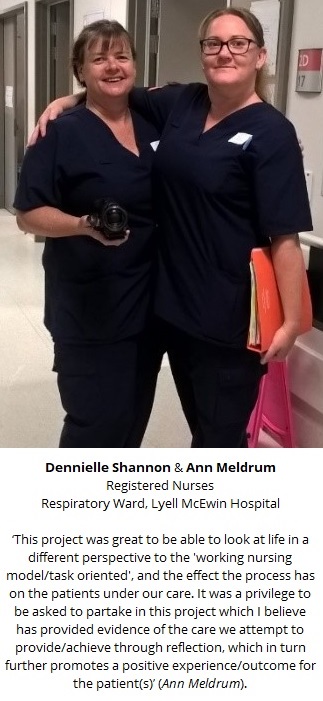Brilliant Palliative Care
A blog post written by Dr Aileen Collier at Department of Nursing, University of Auckland, Associate Professor Ann Dadich at School of Business, Western Sydney University, Ms Catherine Jeffs and Professor Gregory Crawford at Northern Adelaide Palliative Service, SA Health
|
‘It is in the dark, not the light, that a candle shines the brightest’
- Matshona Dhliwayo -

|
COVID-19 – the term that changed the world – how we live, work, shop (particularly for toilet paper), socialise, and care for others. Importantly, COVID-19 not only affects people who require palliative care and their family members, it increases the need for palliative care. For instance, following recent government and organisational directives, it now affects: who can care for, and spend  time with people receiving care in hospitals and aged care facilities; when; and how. These changes can compromise the wellbeing of people who receive and deliver palliative care. Consider, for instance, the patient who is supported by a locum clinician whose palliative care prowess is less than ideal – or the palliative care savvy clinician who, because of the current COVID crisis, is nearing burnout. Furthermore, current calls for ‘social distancing’ (which we prefer to refer to as physical distancing) can compromise a key ingredient of quality palliative care – namely, relationships.
time with people receiving care in hospitals and aged care facilities; when; and how. These changes can compromise the wellbeing of people who receive and deliver palliative care. Consider, for instance, the patient who is supported by a locum clinician whose palliative care prowess is less than ideal – or the palliative care savvy clinician who, because of the current COVID crisis, is nearing burnout. Furthermore, current calls for ‘social distancing’ (which we prefer to refer to as physical distancing) can compromise a key ingredient of quality palliative care – namely, relationships.
Nevertheless, through our program of research, we have found that, in the midst of adversity, brilliance happens. By collaborating with individuals who deliver or receive palliative care, we have come to understand some of the ingredients that enable and sustain brilliant palliative care. Extending our previous interstate research exploring community palliative care, we recently invited individuals at the Lyell McEwin Hospital in South Australia to collaborate with us as co-researchers by capturing, featuring in, and/or analysing what they do on most days – namely, deliver or receive palliative care. We were particularly interested in: identifying the moments that brought joy and delight to clinicians, patients, and family members; and understanding how those moments came to be. This was achieved by harnessing the expertise within this major tertiary hospital. Rather than have external scholars (or foreigners) speculate on the ingredients that enable and sustain brilliant palliative care, this study was led, facilitated, and completed by local experts – those who regularly enact and embody palliative care. It harnesses and elevates the varied forms of knowledge sourced from ‘Outside The Academy’. It can reveal what typically lies beyond a scholar’s lens – or ‘The Understandascope’.
By collaborating with local palliative care experts and non-specialist palliative care providers as co-researchers, we have come to understand that brilliant palliative care is demonstrated by clinicians who are:
- Perceptive, enabling them to anticipate that which might otherwise be unforeseen
- Proactive, whereby they exercise agency and take action
- Person-oriented, demonstrating compassion and commitment to those they support and work with, within and beyond their service
- Pliable in their approach to ensure they are of service – even if this involves risk or flouts organisational conventions and protocols
Although these findings are insightful, we are continuing our program of research to clarify whether and how they manifest elsewhere – and we would warmly welcome the opportunity to work with others to understand the brilliant palliative care they deliver, experience, or are aware of. Only by understanding the ingredients that enable and sustain brilliant palliative care can we collectively weather the current storm of COVID-19, as well as future pandemics.

Dr Aileen Collier, Department of Nursing at University of Auckland

Associate Professor Ann Dadich, School of Business at Western Sydney University

Ms Catherine Jeffs, Northern Adelaide Palliative Service, SA Health

Professor Gregory Crawford, Northern Adelaide Palliative Service, SA Health